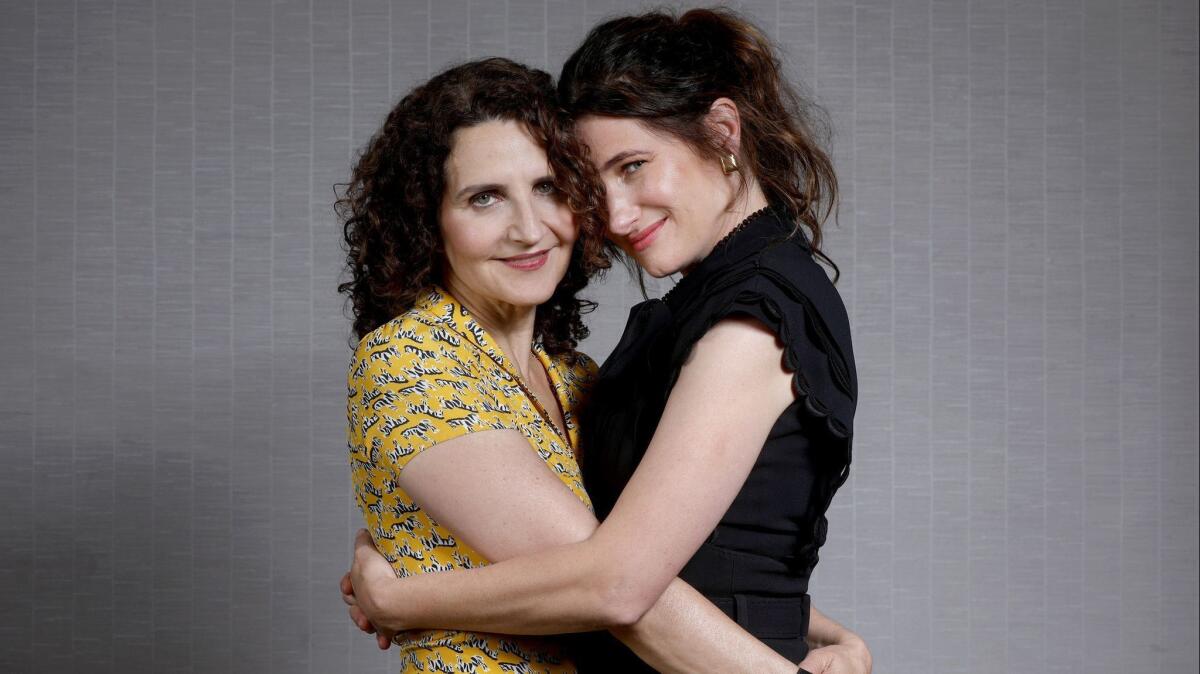Tamara Jenkins and Kathryn Hahnâs âPrivate Lifeâ fleshes out the humor and suffering of infertility

In âPrivate Life,â writer-director Tamara Jenkinsâ long-gestating third feature, a couple (Kathryn Hahn as Rachel and Paul Giamatti as Richard) sees its marriage tested by the trial of assisted reproduction. Itâs a sometimes-uncomfortably intimate peek into a closed-door cycle of hopes and pills and needles â and the damage done. And itâs a comedy, more or less.
âWhatâs so moving to me is it isnât really about the baby,â says Hahn. âI never really pictured a little pink newborn, never smelled the baby powder, never saw the crib in my mind. And that was, like, the saddest thing to me. It was about this journey they were on together, âThe Baby Project.â â
The 40-somethings are in the slow-motion act of realizing their dream of being parents might not be attainable after all.
âAll of a sudden, thereâs a shadow. The sunset is starting to happen,â says the actress, seated beside Jenkins.
âItâs a bummer that our chief money-making years kind of line up with our most fertile. We can freeze our eggs, all these medical options that are available to us, and it doesnât guarantee anything and it costs a ton of money,â Hahn says, with a quiet laugh. âAnd no one is there to say, âStop,â so you get on this roller coaster with no ending.â
Giamatti has pointed out similarities of the story to the non-resolution of Samuel Beckettâs âWaiting for Godotâ: Even if the couple should get âthe thing,â itâs ultimately ânot the thingâ â life goes on, the wheels keep turning. In the meantime, they wait and suffer.
Jenkins says, âIt consumes them. Infertility threatens marriages in an intense way, and it undoes people. It seemed like a good way to study human behavior.â
Jenkinsâ previous studies of human behavior, the acclaimed âSlums of Beverly Hillsâ (1998) and âThe Savagesâ (2007), both drew on her experiences. âPrivate Life,â too, had its seeds in her life, having gone through the process herself. She points out âstories about couples struggling to conceive are ancient. Itâs in the Bible. Edward Albee wrote the most amazing one, called âWhoâs Afraid of Virginia Woolf?â But the advent of artificial reproduction technology makes it different.â
Hahnâs Rachel is complex: intelligent, desperate, unreasonable, compassionate. It was a role the actress desperately wanted (she says, on visiting Jenkinsâ office, she tried to get her âscent all overâ). Casual observers might not see her as a slam dunk for such a demanding role, associating her with extreme comic turns in the likes of âAnchorman,â âBad Momsâ and âBad Words.â
âI sort of saw her upside-down,â says Jenkins. âI watched âTransparent,â and I hadnât seen the big comedies. I thought her performance in âTransparentâ was beautiful. So then I went from her very naturalistic, still kind of performance to the wild and unhinged stuff.â
Hahn asks, âThe Chrysler commercials?â
âThe crazy Chrysler commercial,â Jenkins acknowledges. âI like comic actors. Iâm attracted to actors who can straddle â I always call it the âshimmerâ the shimmer between comedy and drama. Thereâs a shaky in-between place. Thatâs where Kathryn lives, and Paul lives. I donât know how conscious it is. Itâs a point of view. I felt like her point of view as a human being matched the material, also.â
The plot involves the couple enlisting a step-relative in the process, but Hahn and Giamattiâs relationship is the movie. Saying itâs weird to talk about Rachel without Giamatti, Hahn pulls up an empty chair for the not-present actor.
Their joint performance has a kind of âlived-inâ quality that fits right in with their cluttered New York apartment set, its objects taken from the homes of the director and set designer. Many such details came from Jenkinsâ experience.
âThe Poland Spring bottle they turn into the receptacle ⌠It had to be that jerry-rigged sharps container, and there had to be a bunch of needles in it.â Her personal story was different, but she âknew the terrain very well and the emotional core of it.
âI started there, but then it blooms, it takes on a life of its own and becomes invention. I got things from friends, but I definitely had my husband inject intramuscular needles into my ass,â she says, laughing, in reference to the opening scene.
She says the specificity of the filmâs world allowed her to skip exposition.
âYouâre dropped into the middle of the story. Like âDog Day Afternoon.â Youâre not spoon-fed, âOh, my boyfriend needs a sex-change operation.â Youâre wondering whatâs driving them. They certainly donât know how to rob a bank. Youâre catching up, youâre tossed in the swirl of it. I kept saying, âThis is a bank robbery, but itâs IVF!â â
Hahn grins and laughs with a quiet snort: âIf you like âDog Day Afternoonâ and you like Beckett âŚâ
WATCH: Video Q&Aâs from this seasonâs hottest contenders Âť

Five female filmmakers with new projects being released by Netflix came together recently for a group conversation. Haifaa al-Mansour, Susanne Bier, Sara Colangelo, Nicole Holofcener and Tamara Jenkins revealed their personal journeys as filmmakers
More to Read
From the Oscars to the Emmys.
Get the Envelope newsletter for exclusive awards season coverage, behind-the-scenes stories from the Envelope podcast and columnist Glenn Whippâs must-read analysis.
You may occasionally receive promotional content from the Los Angeles Times.










